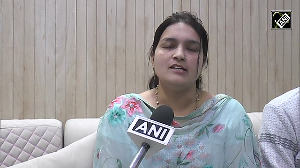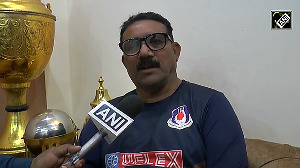After a discussion which went on for over 90 minutes and amid opposition to some of the proposals by ministers, the Union Cabinet Monday evening passed the draft Land Acquisition, Rehabilitation and Resettlement Bill 2011.
It was also decided that the bill will be introduced in the Parliament on Wednesday after which it would be referred to the standing committee.
It was determined that whatever opposition is there to certain provisions in the bill, they can all be taken up in the standing committee which can discuss the issue threadbare and recommend whatever changes they deem fit, after which it would again come before the Parliament in the winter session when it is expected to be passed.
Sources said while a number of ministers spoke, in particular the former chief ministers were more vocal, as they had greater experience of how this would impact the states and what problems would arise.
It is learnt that four former chief ministers opposed the bill on the issue that it will 'kill industry.' They were Union ministers Sharad Pawar, Vilasrao Deshmukh, Sushil Kumar Shinde and Veerapa Moily.
Reacting to them, Rural Development Minister Jairam Ramesh said all these objections can be taken up in detail in the meeting of the standing committee when the bill is referred to it. On that condition it was cleared by the Cabinet.
There was no unanimity on the bill with Pawar raising the issue that industry was unhappy about the issue of annuity where compensation would have to be paid for 20 years of Rs 2,000 per family per month in those cases where the family depended on forest produce for their livelihood and if that is taken away from them.
Pawar said such provisions would not encourage the industry to come forward and set up industries.
While the bill defines 'public purpose' it not only sets up terms and conditions for land acquisition but also focuses in equal measure on issues of resettlement and rehabilitation of those whose land is taken away whether in rural or urban areas.
Ramesh has made a few changes to the original draft bill which was circulated and these were put out in a Cabinet note.
In his original formulation Ramesh had said that the compensation to the farmers will be six times of the market rate, as demanded by both Congress general secretary Rahul Gandhi and the National Advisory Council. But this has now been modified to four times. Similarly, the compensation for the urban land will be twice the market rate.
The note also says that all linear projects like railways, canals and power lines will not be covered under the bill.
In the draft bill, it was categorically stated that no irrigated multi-crop land could be acquired. But the changed version has allowed acquisition up to 5 per cent but an equal area of wasteland within the district will have to be developed.
Also if the land acquired is not used for the stated purpose, it will not be returned to the original owner, but go to the state land authority.
The draft makes consent of at least 80 per cent landowners mandatory if acquisition is for private projects.
'Public purpose' has been defined as land use for strategic purposes, infrastructure and industry. But the consent is not mandatory when land is acquired by the government for its own use.
Urgency clause is to be invoked in the rarest of rare cases like national defence and emergency arising out of natural calamities. There are different land acquisition norms for rural and urban areas.
The states are free to have their own land acquisition laws.
The bill cleared by the Cabinet proposes that if a private company is acquiring land over 100 acres for a public purpose, all the land will be acquired by the government.
The draft bill has factored in West Bengal CM Mamata Banerjee's objections with Jairam Ramesh making two flying visits to Kolkata to discuss the bill with her.
The last time the Cabinet had discussed the bill and passed amendments, she had raised objections. The bill seeks to change an outdated law passed more than a century ago and will also be the first central legislation on resettlement and rehabilitation of families affected by land acquisition.
While there has been a crying need for the bill for the last many decades, social activist Medha Patkar, however, said that the bill has been approved in a hurried manner and questioned the government's intension.
Underlining the importance of the bill, Patkar said, "Farmers and everyone will be affected by this particular act".
But with Rahul Gandhi keen that the bill is passed in the winter session of Parliament before the Uttar Pradesh assembly elections next year, Jairam Ramesh has been working overtime to have it introduced in Parliament before the monsoon session breaks up.







 © 2025
© 2025